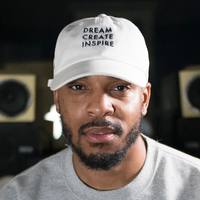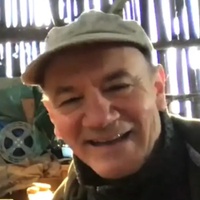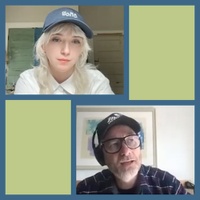As told to Matt Ford, 2437 words.
Tags: Music, Education, Collaboration, Identity, Politics, Process, Success.
On connecting creative communities
Dream Create Inspire Tour co-founder Wayne Watts discusses crowdfunding a “visual mixtape” that would be displayed in 12 cities and connect artists across the world to celebrate Juneteenth.Originally published on July 9, 2021
I was interested in your project especially because to me, it’s an archive. This is a living, breathing continuous archive you’re creating. And with the project revolving around Juneteenth, I see this as a really important Black archive. So, let’s just start there: tell us about the project.
The visual mixtape was the idea of fellow co-founder Destiny Hardney and essentially—it’s funny, as you said—it was really to pay homage to the Green Book. I won’t say repurposing it, but utilizing the platforms that we have today to be able to do it. And because our organization is rooted in being an incubator for creatives, it gives us a chance to galvanize local artists, not just for the sake of being in their home city and seeing themselves, but so that it can connect different cities that are doing similar things. From my vantage point, I’ve seen dope initiatives happening in grassroots spaces.
We don’t want to get in the way of that but just connect those that are doing dope work in Memphis, to who is doing dope work in Denver, to who is doing dope work in Philly. So it’s, “Yo, Coffee Black is a dope coffee shop in Memphis,” right? Whittier Café here in Denver is a dope coffee shop. It would be dope if they did a program. Or if you think of Arena Playhouse, a theater in Baltimore, juxtaposed against Hattiloo in Memphis. Or in Philly, they have Merrill Arts, with Detour being out in Denver. So the idea is just when you go into a city, knowing what coffee shops that you can go into. As an artist or creative, when you’re traveling, you have this safe community that’s around you. When you navigate spaces, you can change the energy around it. When you’re checking into the town, you’re checking in a different place. The energy around your craft is different.
Here in Denver, we partnered up with Nightlights Denver and showcase it [on towers at the] 16th Street Mall downtown. It puts the Green Book on display for everybody. So if a problem happens systemically, we’ve documented it. Before, the Green Book was used to make sure of safe spaces. But in this era, showing the safe spaces is really important to keeping the safe spaces. And the other thing is being able to intentionally connect with people. Right now, we are getting pre-recorded content [and want to be] able to compensate content creators. The old model would be, “Hey, we got this visual mixtape, we’re going to charge artists to be a part of our visual mixtape, and we can charge them what…” But our model is, “[We’re] going to pay you for this to be a part of it because the pre-recorded content that you have is dope.” That’s a different way to go about it that is equitable, and then be able to get it placed in as many different things due to our relationships with places that will pay for it to be played.
How did the organization start and work toward this mixtape?
We started right before our first Kickstarter. I had an album coming out called Nowadays around [intergenerational communication]. I wanted that thesis to connect generations. Co-founder Destiny Hardney was doing community events, and we were talking to people and they were like, “Yo, it needs to be a movement, not just music.” One of the people that helped start her off was Joshua Thompson who was designing clothes at his company called City Limits. He had a shirt called “Dream Create Inspire.” I had worn it in one of my music videos so people were like, “Yo, that’s dope.” We decided to do a “Dream Create Inspire” tour and started a Kickstarter campaign.
I’m very grateful for everything the first Kickstarter campaign taught because crowdfunding is like the independent route in music. And what was funny about it is it can also be the fake independent route, like your stuff is crowdfunded but it’s not crowdfunded because VCs coming in and doing it. But when you do it organically, what you get back from it gives you a level of confidence to navigate anything. Because the campaign—how it starts, the drops, the peaks—gives you resilience, it teaches hustle, and lets you know who are your day one fans, and your day 27 fans—and not holding your day 27 fans accountable to be day one fans. It gets you out of your head of that as the creative. It makes you have to synthesize your ideas into a quick display, and for those who speak the language of enthusiasm, as our organization [does] intentionally, it does well in getting out and galvanizing people. We raised $15,000 to do an eight-city social connections tour. We didn’t know how to do a tour so we started linking with partners but the Kickstarter disciplined us to then know that there’s no wrong answer. If you look at our first Kickstarter and our second Kickstarter, you see the work that we put in, in three years, and that’s powerful.
We turned the social connections tour into an incubator for BIPOC creatives with three pieces: one is programming. We do green track workshops that connect aspiring artists, the incarcerated, senior citizens, and students to work with musicians and visual artists to create collective songs and their own songs to be able to make their own IP (intellectual property). We also have a podcast called Dreams and Talks with aspiring artists getting a chance to talk to amazingly dope leaders. So if you know anybody, plug in. We have somebody that talks to the head of production over at Revolt TV to someone at iHeart Radio. And these are kids that are interviewing them that also may have different businesses. Our youngest one, Eden, is like seven or eight. She has a business called Eden’s Garden and she interviewed someone who is a graphic designer with the NFL Players Association. And we have Creators Only of asynchronous content on YouTube. We partnered up with an organization where people can access it, kids can access it, and do it at their own pace.
The next one is our community events, open mics that we hold. Even in COVID, we were doing socially distant open mics in downtown Denver such as pop-ups and the Visual Mixtape falls right under that. A lot of people donated [to the first Kickstarter] because of our workshop component. We wanted to focus it on our community events so people can get the holistic approach of what we are really incubating.
The third part would be partnership development—connecting artists to partners that will be beneficial for them and giving the game away. We do webinars and say, “This is how you crowdfund,” like passing the plug. A lot of times, people want to keep the plug for themselves but if you pass the plug enough, you’re able to circulate not just the dollar but the social capital within the community enough to be wealthy—not just money-wise but wealthy holistically. Black wealth, as Nikki Giovanni says.
I love her. That’s beautiful. I see the story—how this is coming alive and how you all have worked to bring so many people to this project, to give people a platform to share, to connect. With this venture taking place in the middle of the pandemic, and with this being a project that is interactive, creative, and digital, how are you hoping that people will interact with [the Juneteenth Visual Mixtape] such that they’ll enhance the ways that we think about history?
Couple things: one, the proof of concepts that we do as an organization. We want that to spark…like Tupac says, “I can’t change the world but I can spark the minds who can.” Using that to show that By Any Dream Necessary, it can happen. One of my favorite things that has happened so far is that we have an artist out of London named TBaze who sent this content. He’s never been to the US, I’ve never been to London. He’s Pan-African, so he’s from Africa but living in London, and he wrote his song around the protest that was going on with George Floyd. For him to have it shown in America, he was like, “We got to talk. I don’t know where you are but we got to hop onto Zoom. I wrote that to say, ‘in solidarity we stand,’ and also this is what’s going on in Africa right now.” [As for] how people will interact with it is the connectivity that social media allows, being able to perform on [digital] platforms.
Another thing that inspired me from the pandemic was what Swizz and Tim did with Verzuz ‘cause it got it back to the love of how the music makes you feel. It’s like, “Yo, I loved that song when I was eight. That was my joint.” We’re thinking of how we can do things to honor local artists who are legends in their city that people don’t know. You may have heard Beyoncé out of Houston but you may not have heard Marium Echo who’s performing at Turkey Hut on the regular. You may have heard such and such out of Philly but you may not know Ursula Rucker who is a poet out of there. And to honor—not just honor but honestly disrupt—to make space, to make sure that space stays intact. Those spaces are feeders for artists [to enter big festivals] and those small venues were closing down or in jeopardy of closing down. So, it’s making sure that stays because that’s the sound that everything comes from. That’s the gold which you seek that you don’t even know.
So I guess to answer the question, it would be a combination of all of those things and giving us a chance to then connect with sponsors who are aligned with our organization’s mission. From grassroots on up. How do we funnel artists and make this model equitable for all parties involved so it gives us a chance to get our word out there? We want to connect with sponsors that don’t want the publicity, that are able to give free advertising space to other companies that wouldn’t be able to afford it. In a world where we would be creative, this company would pay the slot for four businesses and it wouldn’t have to be discussed, like, “This was brought to you by…” because it’s going to place [customers] in their stores. I mean, I’m glad that Juneteenth is on it as a national holiday but I don’t want it to be treated how American holidays are.
Oftentimes with Black holidays, we don’t even get that kind of attention to begin with. So we’re changing the whole way that we’re thinking about history.
This is actually the only independence day that there is. This is the day where capital is exchanged at a tremendous rate. All forms of capital—physical capital, money capital, social capital. This could be called Equity Day because we’re thinking about equity and freedom. Think about how much we deserve from all of that, and how long it took for this to become a day when it’s really the only independence day that should be acknowledged. Can’t have an independence day when most of the population is not free.
[Destiny and I are] Black entrepreneurs rooted in social impact and our hope is that the Dream Create Inspire Tour allows you say, “Yo, I just did something that was in my head that nobody thought I’d be able to do.” We want that at the forefront of what we do By Any Dream Necessary because, truly, that is a revolutionary act and creativity is a universal language.
What’s happening today? How is this launch happening? Walk us through this big day.
So first, our Kickstarter launches today to celebrate that we are showing our visual mixtape and the Kickstarter off the tower at 16th Street Mall tonight to kickoff Juneteenth weekend. It features artists from across the world. I think we have Denver, Baltimore, London, and New York. We’ve been Denver-specific but this is our test out of that. Our goal is to have it in 12 cities. We have one goal of $10,000 which would be two additional cities, so I can look and see someone’s performance from Los Angeles’s tower. And you don’t have to be in that city to experience that.
Next week on June 22nd, we have a professional development session with a really dope organization that works with music in DC called the MusicianShip where we’re essentially coming up with musical mantras for kids and mentors. Then, on June 29th, we have the Stars National Conference. While the campaign goes on, we will be doing another workshop with Sofar Sounds. Sofar has been a really dope partner and just a great organization to work with. Sofar does pop-up shows in different, nontraditional music spaces. They started out of London but they’re all over, and what’s great about it for the consumer is that you don’t know who’s performing on the bill. You pay for it but you don’t know where you’re going either. [They tell you the location 24 hours before the event] and it’s at this bakery or at a dope, lit house. You get a different feel of a performance.
When do the Kickstarter and Visual Mixtape runs end, when does the mixtape end? And what’s next for the Dream Create Inspire Tour after this?
The Kickstarter ends on July 18th. We have a visual mixtape on July 16th as our ending it all type of thing. We will have a new tape that will remain on that and then really connecting with artists across the [world]. If there is any organization that wants to be featured on our tape, reach out to us on that. But it’s really building up that tape to run a pilot in different cities in September and run a full tour in quarter one or quarter two of 2022.
Wayne Watts recommends:
Black archives (favorites are The Afro and True Laurels History)
Reciting the mantra “New Era, New Legends” (to honor new legends like the creators of the Know Justice, Know Peace podcast who are leading the way)




